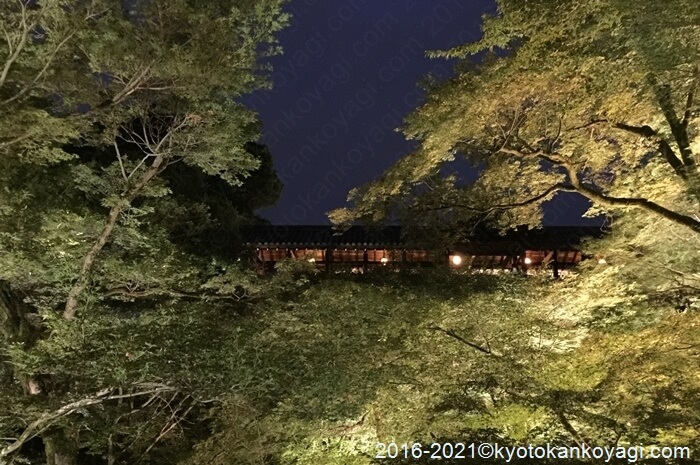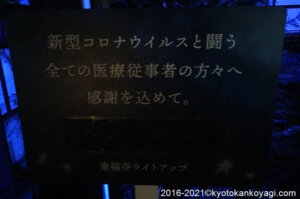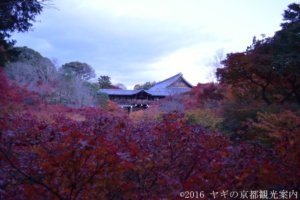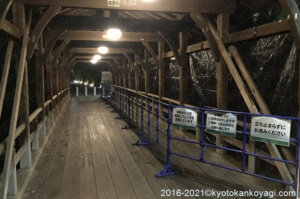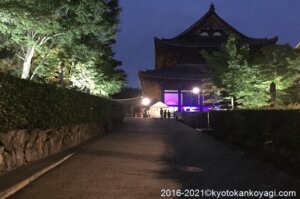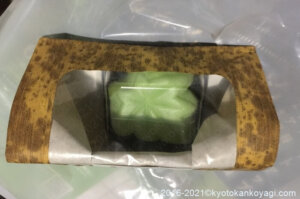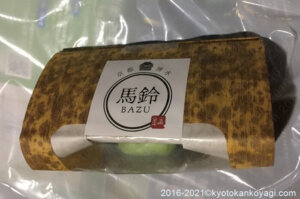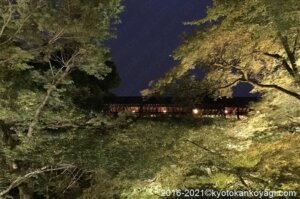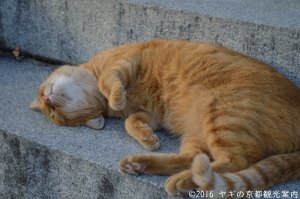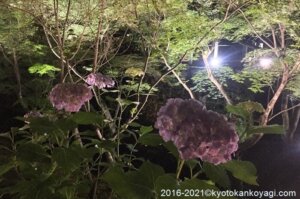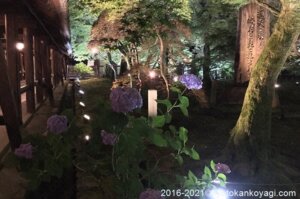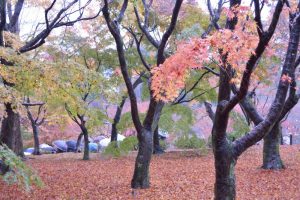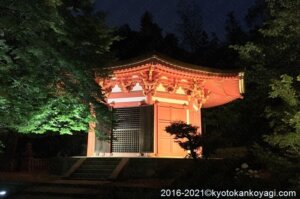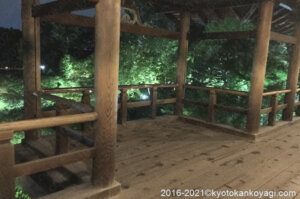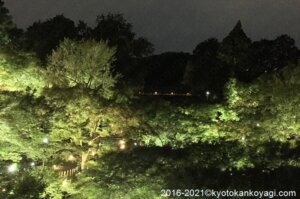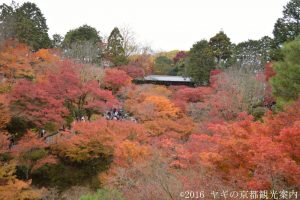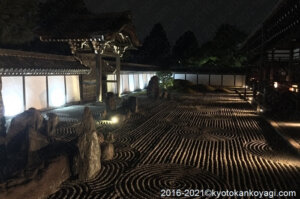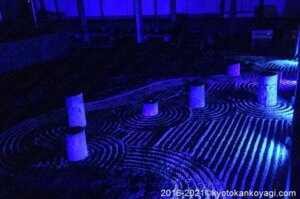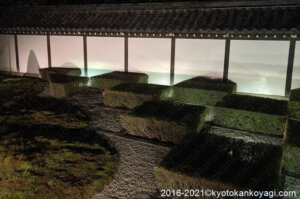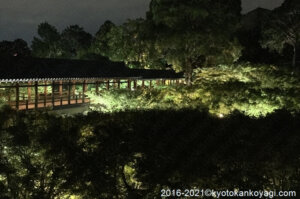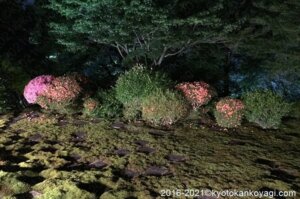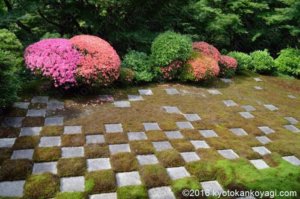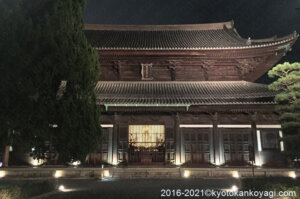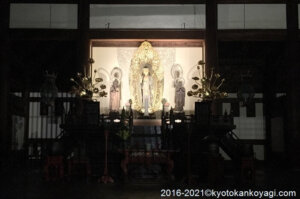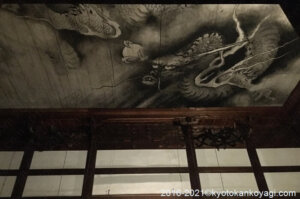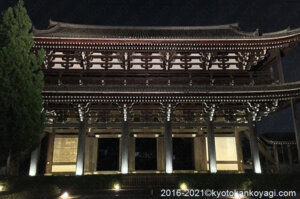Introduction
“We show our gratitude for all the medical workers fight against COVID-19.”
Tofkuji is one of the most famous place to admire autumn leaves in Kyoto. In 2021, it provides us with the first Aomomiji night illumination for the first time in its history. I’ll show you what’s going on there, 合掌
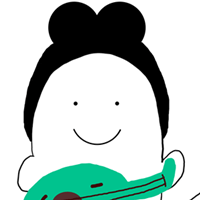
This site and article don’t recommend outing though the state of emergency was lifted. Make your decision with extreme care.
This site cannot guarantee your safety.
The information of shrines and temples are subject to be changed.
This site is not responsible for any disadvantages you have at all.
外出されるか否かは十分な情報を収集の上、ご自身で判断なさってください。本投稿、並びに本サイトは読者の皆様の外出を喚起・推奨するものではなく、三密回避やソーシャルディスタンスなどの確保を保証するものではありません。また、本投稿内の記載事項は変更されることがありますので、ご注意ください。上記、並びに本サイトから起因する一切の不利益に対し、本サイトはいかなる責任も負いません。かならずご自身でご決断・確認ください。
- Dates of 2021: June 4 ~August 9
- Open hours 18:30~21:30(Entrance closed at 20:00)
- Ticket: On the web(Japanese)(2,500 JPY), or at the entrance gate(2,800JPY)
- The Zen garden will be closed after 25 July.

Remember! The entrance gate will be closed at 20:00!
Places we can visit 拝観できる場所
We are to go along the route Tofukuji prepared. It is a one way route but not a strict one. In Tsuten Bashi bridge (通天橋) and Sengyokukan (洗玉澗) area and Hobo Teien garden, we can admire extraordinary Aomomji (Green Maple leaves).
I’m sure you are familiar with this view. The bridge in the photo is Tsuten Bashi bridge and I shoot it on the Gaunkyo bridge(臥雲橋).
Tsuten Bashi bridge is over Sengyokukan vally and located in the area of Tofukuji. On the other hand, Gaunkyo bridge is located outside of the area of it.
Usually, we go to Tofukuji by way of the bridge from the JR/Keihan Tofukuji station admiring a good view of Sengyokukan and Tsuten Bashi bridge.
During the night illumination, the bridge is covered with tarp as you see in the photo for the purpose of preventing people from gathering there.
The entrance is Nikkamon gate. In front of the main hall there is a reception. A special device take your temperature and a staff sprays some hand sanitizer on your hands.
After these, you can have a brochure and a piece of Aomomiji Monaka.
We walk around Sengyokukan vally, admire Aizendo and enter the Zen gardens by way of Tsuten Bashi bridge. Then, we admire the main hall and Sanmon bridge.

Now let us get down to business, BAAH!!!
Sengyokukan Vally 洗玉澗
Sengyokukan is a valley lies under Gaunkyo and Tsutenbashi bridge and one of the most famous places to admire autumn leaves and, of course, Aomimiji thouth it used to be filled with Sakura.

In the 14th century, a monk named Mincho (明兆) of Tofukuji painted extraordinary Nehanzu (涅槃図). Nehanzu is a picture shows us a moment in which Gautama Buddha’s death.
Ashikaga Yoshimochi, the 3rd Shogun of the Ashikaga Shogunate, highly acclaimed it.
He wanted to give him reward and asked Mincho, “What do you want?”
He replied, “Cut off all the Sakure trees. I want them to be cut because lots of people gather around them in Spring. They are very noisy and annoy monks.”
Yoshimochi made his wish came true.

Yoshimochi is a son of Ashikaga Yoshimitsu who founded Kinkakuji temple.
I’m in the Nehanzu he painted, ニャー(In Nehanzu, people and animals cry around Gautama Buddha. Usually, we cannot find cat in Nehanzu.)
On June 13, Ajisai (紫陽花), or hydrangea, were in full bloom

Sengyokukan in night is such a beautiful place to see. If Kyo no Tanabata were canceled, it would be the best place to visit instead.
It reminds me of Polly Brown’s So Much in Love.
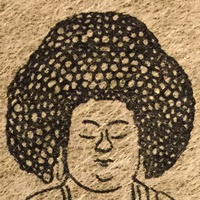
Enjoy Sengyokukan in fall.
Aizen doh hall 愛染堂
Aizen Myo Oh, a Deity who brings us LOVE, is enshrined there. 。

煩悩即菩提
Tsuten Bashi bridge 通天橋
Tsuten Bashi bridge is the most famous place in Tofukuji to admire Autumn leaves in Sengyokukan vally. In Aomomiji season, it gives us incredible views as it does in fall.
Tofukuji has 3 great bridges. Gaunkyo, Tsutenbashi, and Engetsukyo bridge. On Tsutenbashi, we can find Engetsukyo bridge illuminated on the opposite direction of Gaunkyo. Engetsukyo is a bridge to visit Ryoginan(龍吟庵) which has the oldest Hojo. Hojo is a place which monks live in. Engetsukyo and Ryoginan are illuminated thougth we cannot enter them.

The view from Tsutenbashi in fall.
Honbo Teien gardens 本坊庭園

Honbo Teien garden is open to us by July 25.
We cannot visit Honbo Teien gardens with shoes on. At the entrance, take your shoes off and put them in a plastic bag prepared for you.
Honbo Teien gardens called “Hasso no Niwa.” They describe 8 stories in the life of Gautama Buddha.
The south garden is so-called Zen garden.
The east garden is also a Zen garden. These 7 poles stand for the big dipper.
In the west garden, well-trimmed Satsuki make check patterns.
At Tsutendai located near the west garden, we can have a good view of Tsutenbashi and Sengyokukan.
In the north garden, stones and mosses make check pattern.

There is a Satsuki trimmed in heart-shape.
The main hall 本堂
The main hall was constructed in 1934 after the fire happened in 1881. It enshrines a statues of Gautama Buddha and those of his guardians. On the ceiling, there is a huge dragon painted.
We can take photos of them though usually strictly phohibited.
Sanmon gate 三門 (National Treasure)
It is constructed by Ashikaga Yoshimochi as his donation. It is the oldest Sanmon gate of Zen temple. Sanmon means “the gate for enlightenment” and usually located in front of the main hall.
About Tofukuji temple 東福寺基本情報
How to get to Tofukuji? 東福寺へのアクセス
About 10 minutes walk from JR/Keihan Tofukuji station.

